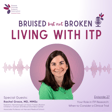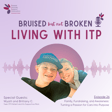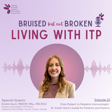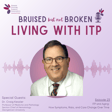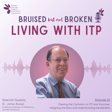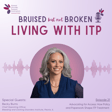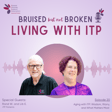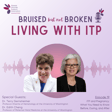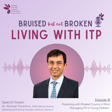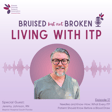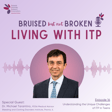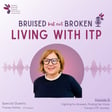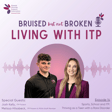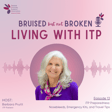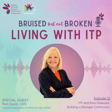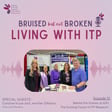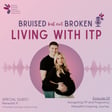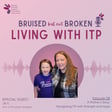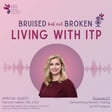Become a Creator today!Start creating today - Share your story with the world!
Start for free
00:00:00
00:00:01

From Awareness to Action: How ITP Patients Can Influence Policy
In this episode of Bruised but Not Broken: Living with ITP, host Barbara Pruitt dives into the critical role of advocacy in making immune thrombocytopenia (ITP) a recognized priority in Washington. Joined by PDSA President and CEO Caroline Kruse and Government Relations Consultant Jim Romano, they discuss the ongoing fight for federal funding, the importance of patient voices in policy change, and how you can get involved—whether in person or virtually. Learn how sharing your ITP story can influence lawmakers, push for Centers of Excellence, and secure essential resources for the ITP community. Tune in to discover how you can be part of this powerful movement for change!
Transcript
Introduction and Purpose of the PDSA Podcast
00:00:00
Speaker
The benefit to patients is that it's just very empowering. We're just asking you to share your story.
00:00:16
Speaker
Welcome to the PDSA podcast, bruised but not broken, living with ITP.
Living with ITP: Challenges and Hopes for a Cure
00:00:21
Speaker
The diagnosis of a bleeding disorder like immune thrombocytopenia may leave you wondering, how can I really live my life with ITP? PDSA's podcast, Bruised But Not Broken, Living With ITP, brings empowering stories, the latest research and treatment updates, lifestyle tips, and answers to the real life questions the
00:00:54
Speaker
Hello and welcome to Brews But Not Broken, living with ITP. I am your host, Barbara Pruitt. And speaking as an ITP patient, we want a cure or at least a treatment that's going to help help us and work for us.
The Need for Federal Funding in ITP Research
00:01:14
Speaker
The bottom line is research isn't cheap.
00:01:18
Speaker
Most research is funded by the and NIH, which is the National Institutes of Health, and the government controls how much money they get. We are rare disease and not very well known. I feel, and I know you feel the same way, we need to be heard. We need to have a voice, which leads me to advocacy.
Advocacy on Capitol Hill with Caroline Cruz and Jim Romano
00:01:44
Speaker
Today,
00:01:46
Speaker
I want to discuss advocacy on Capitol Hill, and I've got two very important, knowledgeable guests today. The first is Caroline Cruz, who I'm sure you know is the president and CEO of the Platelet Disorders Support Association. And joining us also is Jim Romano.
00:02:07
Speaker
who is the founder of Care and Cure Partners and is the PDSA's Government Relations Consultant. So welcome to both of you. Thank you so much, Barbara. Thank you, Barb. It's so nice to be here. Great. I'm hoping that we can eliminate what advocacy is all about as far as a nonprofit like the Platelet Disorder Support Association.
00:02:35
Speaker
Caroline, how how do you feel about it and how have you proceeded? Well, in PDSA's 26 year history, we have never received any federal funding. So for example, the Centers for Disease Control and Prevention, the CDC, they receive around $5 million dollars annually for their blood disorders program. But none of that can be used for ITP education or surveillance programs Despite the fact that I was actually told last year by the director of the Division of Blood Disorders at the CDC that he gets more calls about ITP than any other blood disorder.
Personal Experiences and Their Role in Advocacy
00:03:19
Speaker
And while PDSA has tried over the years, even going back to PDSA founder Joan Young and some of our medical advisors to engage with the federal government
00:03:32
Speaker
and receive funding, even develop ITP centers of excellence, we really went nowhere. And so we've had some advocacy initiatives, some hill days over the years, which I know we'll talk a little bit more about. But I have known Jim Romano for a number of years. And back in 2022, we met in Washington, D.C.
00:03:57
Speaker
We were both attending the North Summit, and that's the National Organization for Rare Disorders. And I was aware of Jim's many accomplishments having worked on Capitol Hill and having worked for a number of other nonprofit organizations and helped them with their advocacy initiatives. So I just felt it was time to to bring in the big guns. So that's how PDSA ended up hiring Jim care and care partners and his partner, Dane Christensen. And we've had great, great success thus far. It's been wonderful. It's been a wonderful, I think it's been a wonderful relationship and I've gotten to meet so many wonderful patients. And I'm very excited because we've had some really successes
00:04:46
Speaker
And I think there's a lot more we can we can do. So it's been great. And I love working for the ITP community. And and it's very interesting. Everywhere I go, I get a lot of meetings, patient meetings and all people say to me, Oh, who else do you work with? And I say, I work with um the ITP. I have ITP. I forwarded so many patients.
00:05:08
Speaker
over to Jodi and to the, ah because I run into them all over the place. And it's wonderful. I mean, to me, it's wonderful to be able then to bring the patients to the organization. So it's been great. I think something that we find in life is the more as a patient or families of patients talk about ITP, it kind of connects other people.
Strategic Partnerships and Legislative Initiatives
00:05:33
Speaker
Oh, so and so has that, you know, I knew a girl when I was whatever, you know, you hear about other people that have ITP. And if you don't up in your mouth and talk about it, you're not going to get those connections. So that's exactly what's happening with you, Jim.
00:05:47
Speaker
What are some of the past advocacy initiatives that PDSA has been involved in, Caroline, or both of you? Well, for more than 20 years, PDSA has been a member of NORD, which is the National Organization for Rare Disorders. We've also partnered with other like-minded organizations like PPTA, which is the Plasma Proteins Therapeutic Association,
00:06:15
Speaker
the immunocompromised collaborative, um because of course there are not there's power in numbers, right? And we're a small organization. we PDSA has never had a legislative or government relations person on staff. We don't hire lobbyists like other you know larger nonprofit organizations do. So we've never spent money or had initiatives where PDSA staff could actually do the work. So that's why We do partner with these like-minded organizations. We'll sign on to important pieces of legislation that we feel will help our patient population. Every year, I or other members of the staff go to Washington DC in February for Rare Disease Week. Back in 2017, I was asked to moderate the annual congressional caucus and had the honor of introducing
00:07:15
Speaker
Senator Amy Klobuchar from Minnesota. And I've participated in a number of scientific and medical meetings in Washington DC sitting on panels with members of the and NIH, the FDA, the CDC. So those are some of the ways that we've been involved with advocacy over the years.
Hill Day Experiences and Impact
00:07:36
Speaker
And we have hosted several Hill days The first one was in 2013, as you know, Barb, you and your husband, Peter Pruitt, who's PDSA's board chair, and many other ITP patients participated in that event. We went back to the Hill in 2017 with members of Thizna, which is the thrombosis and hemostasis societies of North America. The focus of those two Hill days was more just about funding for rare disease education around rare disease and bleeding and c clotting disorders.
00:08:09
Speaker
But the past two years, I've been to the Hill with Jim and with his partner, Dane, a number of times where we've specifically talked about the needs of the ITP community, ah the unmet needs, I should say, of the ITP community.
Building Congressional Relationships for Local Advocacy
00:08:25
Speaker
And last year we held two virtual Hill days with ITP patients and caregivers. And I think you know the benefit to patients is that it's just very empowering. We're just asking you to share your story. I don't know how you feel about it, Barb. Maybe you can yeah share your experiences.
00:08:45
Speaker
Well, the first time that I went, like you said, back in 2013, when we were there in person, it was really my first exposure um to the Hill. And I thought it was very exciting to sit down and and actually meet with a member of Congress. Usually you're meeting with one of their staff and we were able to actually meet with a member of Congress on that day. I've also participated in the virtual Hill Day.
00:09:13
Speaker
which was last year and it was different and that we weren't there in person. However, I felt like we were being heard and I thought it was important and I think it was a very easy way for us to participate. I think we made an impact. I hope we did.
00:09:31
Speaker
because Jim, you're the one that set them up correctly, set up the- Yes, I set up a number of them. and Actually, Barb, it's interesting. You're in Peter's. A member of Congress is a woman named Maria Salazar. and I've gotten to know her through another. I've been working with her office previously, and because she's very constituent focused, so because that but you and Peter met with ah Sean Smith is her aide. He's a great guy. They want to be very involved. We've been very successful at the end of one administration and the beginning of a new administration. And things are are are fascinating. I'll say that. And so we've been working to put together a meeting with the CDC that kind um one of our congressional allies is involved with. And then Congressman Salazar's staff has been very clear
00:10:23
Speaker
that they want to be in part of it because they want to become champions for the ITP community also, which I think shows, I always tell people, it's one of one of the adages I believe is, and it goes back to ah ah Tip O'Neill had his saying, all politics is local.
00:10:42
Speaker
All advocacy is local. And I firmly believe that you so you start in the center, which is who your state representative, state senator, and congress a member of Congress are.
Agenda Setting for Hill Day and NIH Funding
00:10:54
Speaker
And if they know who you are, I always say, you know who they are, but make sure they know who you are. And that means meeting with them at least once a year. And really have them understand how ITP affects you. And I had started out in the hemophilia community with family members. And everybody I met with knew under understood how hemophilia affected my family, how they were infected with HIV through contaminated blood. And everybody knew that story. And so um people would stop me in the hallways and say, oh, yeah, you're Jim with hemophilia. Well, what we want to make sure is when when you're out in the community or or on Capitol Hill, people stop
00:11:37
Speaker
you barber and say, oh yeah, you're barber with ITP. And so the way to do that is by being there and participating and knowing who they are. And so and making it like I always say, make sure they know who you are. And that might be attending a little bit more, raise the bar civically, I always say, the Congress person's having an event in the district to attend if your schedule allows.
00:12:01
Speaker
if your finances permit you to attend a fundraiser, those are the type of things that then really raises the bar with the office. And so building those relationships are so important. Now, let me ask, when you as a patient, when if we were to participate in a virtual Hill Day or an actual in-person Hill Day, is there usually an agenda as far as what we want to ask them to do? I mean, how do you go about that?
00:12:31
Speaker
I'm going to say yes. So we get together and we talk about the issues. A great example is NIH. We talked about how we would like to build a bigger research portfolio for for ITP and platelet disorders at the National Heart, Lung, and Blood Institute. That was a goal we have. How we go about that is really putting pressure on the Congress to include language in a bit and the Labor Health and Human Services appropriations bill.
00:12:58
Speaker
It has to pass every year because it funds every health program in the United States, federally. So there's so all different agencies under the Department of Health and Human Services. and And NIH, the National Institutes of Health is one of them. And the CDC, there's HRSA, ah CMS, which which funds your Medicare and Medicaid programs.
00:13:24
Speaker
and There's a report that accompanies that spending bill that basically I hate to say it's instructions of how they like to spend any increases or new monies or such.
00:13:38
Speaker
And for the last several years, we have been able to get ah basically ITP language included in those reports saying you really need to work with the ITP community in fostering a bigger research agenda. um That's led to a couple of calls with the NIH, but also then what a next step in that approach is if investigators have submitted for grant funding from NHLBI, which is the Heart, Lung, and Blood Institute. We need to hear back whether they've been accepted or not, because then we can go back to Congress with with that and say, well, listen, our our scientists are are submitting applications for funding, but they are being turned down for various reasons. One of them might be because there's not enough funding. And so thus, then we can really start pushing and getting our champions
00:14:32
Speaker
to be a part of that. So we do have an agenda and my partner and I, Caroline, and we're going to do a lot of the work behind the scenes to get the agenda advancing. The good news is like we had a letter to the CDC and it was getting members of Congress to sign on the letter, which for a first time we, you know, we got close to like 15 members of Congress between 15 members of Congress and 20 to sign on that letter.
00:15:02
Speaker
And that's what we want to do. So the patient, by telling their story on how this is important to them and the and how they're living or they're living with ITP or a caregiver, then they can go back and as a constituent and say, please sign this letter, which is going to help us obtain federal funding, help us put together centers of excellence.
00:15:25
Speaker
and get Congress very interested in working with us and having more partners. Because the more groundswell we build, obviously the more likely then we'll be successful. I was just going to say the reason that we got that letter ah from 15 members of Congress in the first place was because we went to the Hill, because we had these virtual Hill days, because we went in person numerous times over the past two years, and because ITP patients and caregivers shared their stories. And it may seem intimidating if you've never been to Capitol Hill to meet with members of Congress,
00:16:06
Speaker
But as Jim said, we do all the the the work behind the scenes. We're going to give you the talking points. We're going to tell you, we're going to give you the agenda. We're going to give you the schedule. We're going to tell you what's going to take place. All you really need to do is share your story. And nobody knows your story better than you. And that's the most compelling part of these meetings. So typically, just to kind of set it up visually, you know we might have anywhere from five to 10 people in a group. And that would could be a combination of patients and caregivers and PDSA staff, maybe a few of our medical advisors or board members. And we will all go into our constituents so office. So
00:16:53
Speaker
You know, Barb, you live in Florida. And as you mentioned, Maria Salazar is your Congresswoman. and So you would and and people who live in your congressional district would go visit a Congresswoman Salazar and you would share your story. And then we would talk about the unmet needs of the ITP patient population.
Patient Stories as a Tool for Effective Advocacy
00:17:13
Speaker
And then our ask, so to speak, is that we really need to be included in the blood disorders program at the CDC.
00:17:21
Speaker
or there's a real need for ITP centers of excellence, and how can Congress help us achieve that goal? And so that's that's typically what happens when you go to Capitol Hill. I will say it is very serious business, but it's also very empowering, exhilarating, and going to the Hill with Jim Romano, who knows everybody,
00:17:44
Speaker
and who is a huge history buff and can tell you anything about anything. You walk down the hall and there are you know portraits of ah different Congress people you know going back to whatever, the 1930s or the 1960s, and Jim can tell you a story about that person. So while it is serious business, it's also very fun. Well, and I i know from my own experience, when you're in their office. you know Their staff members are regular people. They don't know anything about ITP. um And they you're eliminating them. You're letting them know. and And in as much as I know so many ITP patients, we look very normal from the outside and we look healthy and you know nobody knows what's going on inside. So it is important to you know to let them know
00:18:36
Speaker
your story and how how you feel and how you go through your life and what are your obstacles that you have to overcome having ITP. Let's say you are a patient with ITP living in North Dakota. Can't travel to you know Washington DC necessarily. How can they participate? I mean, do they call the PDSA office and say, can I be involved? How how should that work? You picked the wrong state. No. um
00:19:08
Speaker
We would do virtual. Absolutely. ah For people who can't travel, although like I gotta say, you know, the Senator from South Dakota is now the majority leader. So it's probably is important if they can participate and come to DC. It is very important that they do that because the leadership can make things happen faster than anybody.
00:19:30
Speaker
If John Thune, who's the senator from South Dakota, says, I want this done, pretty much it's going to get done. If Speaker Johnson wants something done, it's pretty much going to be done. So again, having ah patient advocates in Louisiana or South Dakota, ah New York. Well, we should actually have them from all 50 states if possible.
Educating Congress and Comparing ITP to Other Disorders
00:19:53
Speaker
I mean, that would be great. And really,
00:19:56
Speaker
If you're an ITP patient out there listening to this, it it doesn't hurt to make a call. and it and And if you're doing it virtually, I mean, you're in the comfort of your own home and you just needed to tell your story and to you know let them know what's going on so that ITP is something on their mind and they know what it is. I like to say that when it comes to a member of Congress, you never know where one's going to go. My member of Congress last term. She was here for a couple of years now. She's running for governor. And I get invited to fundraisers and events with hard out running for governor, but it's a great contact to have. There's very few members of Congress who I would tell you not. Yeah, that's that's not
00:20:41
Speaker
important, I wouldn't go to that office. Just because they're very controversial. It's not even that they're controversial. that they don't they're They're not helpful. and and but But I would say that's three or four offices on both sides of the the aisle that I stay away from. 95% of it, you're going to want to meet with them and they're going to want to be helpful to you.
00:21:05
Speaker
That's good to hear. Majority of staffers are all younger. I can say that now because I'm older, but they're but they're all younger. They show such an interest in patient stories. They're so kind and thoughtful, ask really good questions. I think one of the biggest challenges that that our community faces when engaging in our advocacy work and we go to the Hill is that most people we meet have never heard of ITP. Our opening line when we go to go to the Hill is, ah you know I'm sure you've heard of hemophilia and almost everyone has heard of hemophilia. And we'll ask, have you ever heard of ITP? And the majority of people will say, no, I've never heard of ITP. And then we'll say, well, you know ITP is a bleeding disorder and four times more people have ITP than hemophilia.
00:21:57
Speaker
yet we've never received any federal funding.
Future Plans: ITP Hill Day and Congressional Luncheon
00:22:00
Speaker
And that's, of course, not to take ah anything away from the hemophilia community or you know the funding that they receive, but that's just to show the difference between our community and how many people are impacted by our disease. And it just seems to spark an interest.
00:22:19
Speaker
in the congressional staffers who we talk to um and even members of Congress on the occasion that we've met with members of Congress. And there always does seem to be some type of connection when you share your story. I mean, I remember a number of years ago when we met with Congressman Joyce from Ohio and his wife happened to be a nurse at the Cleveland Clinic and worked with one of our hematologists. So he was, of course, very interested There have been staffers where maybe there's not a connection to ITP, but remember, Jim, when we went up with with my daughter, Alex, who happened to be a PDSA's research coordinator, and she had, in high school, she had participated in speech and debate with the staffer, an important staffer from one of the offices. So there always seems to be a connection when we go into these offices. and
00:23:13
Speaker
As I mentioned, Jim and Dane dee seem to know anybody or know everybody anyway. So it's a really great event to participate in. And we're planning on doing a larger Hill Day on May 21st. And there'll be more information on the PDSA website and in the e-newsletter and quarterly newsletter coming up within the next month.
00:23:37
Speaker
But we're hoping that patients will be able to join us in D.C. and participate in that Hill Day. And we'll be hosting a congressional luncheon as well. Oh, that that sounds great. I mean, to have a congressional luncheon, making them aware of what's going on. And, you know, like you said, hemophilia is a case in point where people are very aware of that, but they're not aware of
Continuous Advocacy and Support Building
00:24:00
Speaker
ITP. So that sounds great.
00:24:02
Speaker
But we can get there. I would say that hemophilia probably has about a 20-year head start. um They do their Washington days every year. They bring in 450 patient advocates from across the country. They make sure every state's covered. They use it as a way of promoting their their funding.
00:24:23
Speaker
for at their hemophilia treatment centers. So, I mean, we'll get there, but I mean, they started small and and build up, but it's ah it's a great um example of of what we can do because having seen it firsthand and being a part of it for many years,
00:24:40
Speaker
They do bring in their patients. It's a, it's a, it's a, it's a large event in Washington. So we can replicate that, um, on a smaller scale and then keep building that. But even if there's not humongous issues that are facing the community, I feel like some people think, okay, we've accomplished what we wanted and okay. So we're going to take a couple of years off or.
00:25:04
Speaker
And so we're confronted with another issue. And I always think that's a mistake. Advocacy is like an insurance policy. If you keep going up there and keep meeting, keep the relationships, build new relationships. If you have every two years, you're always going to have a freshman class that come in.
00:25:22
Speaker
Old people retire, new people come in. I hate to say this, but you're going to see about five or six members of Congress resign or pass away in the next two years, and they'll be all kind of special elections. And so there's always going to be new people to educate. To meet and educate, sure, yeah sure. so keeping that it's it's very important to keep that going here's a there is a congressman congressman johnson of ohio re designed to become the president of the university in his district and caroline and i and alex went in and met with the replacement the new guy and now the new guys on energy and commerce and they kept saying anything we can do to help that is a refrain that i've we're getting we're getting a lot of which i'm very excited about anything we can do to help well that's great because
00:26:06
Speaker
We have report language and so a lot of places of what where we'll be going back. So when they say that, you know what to say to them. Anything we can do to help. Well, this is what we need. This is why we need your help. And this is where we want to direct you. Jim and I are going back to the Hill on February 20th to introduce PDSA and ITP to the new two new senators from Ohio. So to Jim's point, over the past couple of years, we had built a relationships with the two senators from Ohio.
00:26:40
Speaker
who were very supportive of the work that we were doing. And of course, PDSA is headquartered in Northeast Ohio. And now the vice president, J.D. Vance, was our senator from Ohio. So there's somebody new in his seat. And then the other person, Sherrod Brown, from Ohio lost his seat. And so then there's someone new that we have to introduce ourselves. And you're kind of starting all over again, although we have many other champions in Congress, including Congressman Darren LaHood from Peoria, Illinois. And he has been very supportive of PDSA medical advisor, Dr. Michael Tarantino, who has the Pleading and Clotting Disorders Institute in Peoria. And he's been a real champion for Dr. Tarantino and the patients that he sees, including
Engaging Patients in Advocacy Efforts
00:27:34
Speaker
ITP. And so he has become a real champion for PDSA and the ITP community.
00:27:40
Speaker
Well, this is great. this This is so wonderful to hear that the PDSA with the help of Jim, that you're making our presence known that that that the government is finally being aware that there is a disease out there called ITP and it's affecting lots and lots of people. I know what 200,000 in the US we think. I know that number fluctuates, and but we need to be heard and we really appreciate everything that you all are doing as as a patient. I really appreciate it because I know that
00:28:18
Speaker
Everything you're doing is going to lead to some successes with the treatment of ITP. And that's that's what the PDSA is all about. Right. And, you know, Barb, there's there's other ways that people can participate and share their story, even if they don't come to Capitol Hill with us or don't participate in the virtual Hill Day, just by raising awareness of ITP. That's really, you know, the the the crux of advocacy work. So they can participate in Awareness Month in September or ah Sport Purple for Platelets Day. They can participate in the PDSA walk runs. They can submit their story to us so that we can share it in our various publications. So that those are different ways that patients become can become involved. And again, what we hear from patients is that it's very empowering for them to share their story.
00:29:15
Speaker
True it is and I know I've read many stories too about even children sharing with their classroom what they have and having someone come in and explain it a little bit easier than all those kids know and you know in that classroom and it starts small like that but then those children tell their parents and it goes on and on um that that ripple effect.
00:29:38
Speaker
I have to believe that there's probably a member of Congress or so who has ITP or a family member with ITP. And then I know there has to be state representatives and state senators all over the country that are ITP patients.
00:29:53
Speaker
My goal is to find out one of my private goals is to find out who they are and and connect them with this organization because yeah a state rep wants to be a congressman. And so we want to we want to make sure we're building future champions. So I'm going to find out who they are. But they' I had just I there have to be the odds are in our favor for that. there There is Jim. I just don't know that person's name. So if you can find out, let us know.
00:30:22
Speaker
If our listening audience knows of anyone like that also, that's important to let us know. um We're always looking for champions for i ITP. And if you know of somebody that has a high visibility, whether it's a you know, somebody from Hollywood or the radio or music or, or specifically government, let us know, because um who knows where that can lead to. And doctor patient privacy, they are doctors and other doctors can't tell us if one of their patients is
00:30:57
Speaker
very notable person that people would recognize. So we've got to do the groundwork to find those people. But well, this has been very interesting. I appreciate all that you all are doing. Is there anything left that you want to tell us about before we wrap it up?
00:31:15
Speaker
I would love to just say we'd love to work with you if you have a relationship with your congressman and you'd like to to bring that to our attention. We'd love to work with you to obtain a virtual meeting or it come to Washington. If you don't know who your congressman is, I would gladly work with you. It's very easy to find out. I know a lot of people don't know who their congressman is. So um I would love to work with you and help you build that relationship.
00:31:42
Speaker
Terrific. Just just contact us at PDSA at PDSA dot.org or give the office a call. Again, just look out for more information about the May Hill Day because we would love for folks to participate in that event. too Sounds like a great opportunity. Hopefully we'll get a lot of participants. We've got time to our advantage. So people, if you're planning on a vacation in the Washington area, that might be the right time to go. So Well, thank you again, Caroline and Jim, and for all that you're doing for our ITP community. And we'll keep you posted on Brews But Not Broken, living with ITP as far as what the future holds for us. So thank you again.
00:32:32
Speaker
How do you live your life with a bleeding disorder like ITP? From working in the kitchen with knives, to navigating sharp corners in your house, going out to eat in a restaurant, traveling on a plane, attending a sporting event, even dancing at a wedding. ITP patient, Arbor Pruitt, shares her tips and tricks for moving through life with ITP for more than 60 years. Here's her lifestyle lesson for the day.
00:33:03
Speaker
ah About 10 to 15 years ago, I found out about something, actually a medication, and I carry it with me in case I need it. It's one of those just in case meds that I use if I was to have a fall or a nosebleed or something like that. It's called transaminic acid. Let me spell that for you.
00:33:30
Speaker
T-R-A-N-E-X-A-M-I-C. Acid, A-C-I-D. It might be something you'd want to speak to your doctor about. What is it and how does it work? Let me try to explain from my perspective how it works. When you fall and you have a blood vessel that has a leak in it,
00:33:59
Speaker
And, you know, as the blood leaks out, that's what a bruise is. So when you fall, the normal course of events with that leaking blood is that a platelet will come by to help clot over that leak. And then there's a cascade of events that happen that cause the clot. Well, as you and I know, we don't have the same amount of platelets as a normal person. so we have the unfortunate opportunity to leak more blood. And what happens normally is when a clot is formed, it starts to then break down. That's the normal course of events. And what this transaminic acid does is it slows down that breakdown of that clot.
00:34:58
Speaker
And what does that mean for you? That means that the clot will stay there longer so you won't have as much leakage of blood out of that injury that injured area. And it actually helps you not to bruise so much.
00:35:18
Speaker
And I use it if I get a nosebleed. I mean, I do other things too, but I will take one if I get a nosebleed um or if I fall. You know, I'm always saying you really have to be in tune with your body and.
00:35:32
Speaker
When I say that, I think you you get to the point where, you know, if you hit your arm or something, you know it's going to leave a bruise or you know it's not going to leave a bruise. If you hit it hard enough in the right place, you're going to feel that, oh, I'm going to get a big bruise. Well, that would be a time to take one of these pills. I know that doctors give it to women with ITP.
00:35:57
Speaker
if they have heavy heavy menstrual periods. So it helps with that also. But I keep it on hand and I might use it occasionally, but it's something you might want to talk to your hematologist about if you are not aware of it or if he or she hasn't spoken to you about it. So anyways, that's my little personal lifestyle tip of the day. Again, it's transaminic acid, T-R-A-N-E-X-A-M-I-C, transaminic acid. So have a great day.
00:36:39
Speaker
Thanks for listening to the PDSA podcast, bruised but not broken, living with ITP. Made possible by our presenting sponsor, Amgen.
00:36:51
Speaker
Special thanks to Gus Majorga for composing our theme music. To see what's coming up, visit our website at pdsa dot.org and subscribe wherever you get your podcasts. Please share this podcast through social media with anyone who you think might benefit from the information and stories we share with the ITP and other platelet disorders community.
00:37:14
Speaker
As always, please speak with a health care professional before making any treatment decisions. But know that PDSA dot.org is a wealth of information and resources to help you navigate life with ITP and other platelet disorders.
00:37:31
Speaker
Remember, you are not alone.
